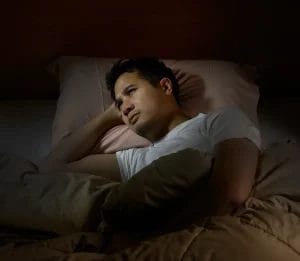Does a lack of sleep trigger your migraine attacks? Do you have trouble sleeping? You are not alone if you answered “yes” to either of these two questions.
According to the American Migraine Foundation, people living with migraine are between two and eight times more likely to experience trouble sleeping (sleep disorders) than the general public. People with chronic migraine, which means having 15 or more migraine/headache days per month, report being twice as likely to suffer insomnia as those without chronic migraine. In addition, the combination of migraine attacks and other chronic conditions (comorbidities) can further impact your ability to get a good night’s sleep, often creating a vicious circle of pain and fatigue.
Insomnia
 According to the National Heart, Lung, and Blood Institute (NHLBI), insomnia is a common sleep disorder. People with insomnia may have trouble falling asleep, staying asleep, or getting good-quality sleep. Symptoms include:
According to the National Heart, Lung, and Blood Institute (NHLBI), insomnia is a common sleep disorder. People with insomnia may have trouble falling asleep, staying asleep, or getting good-quality sleep. Symptoms include:
- Resisting going to bed: Teenagers and children may resist going to bed, but adults do this sometimes as well.
- Taking a long time to fall asleep: You may lie awake in bed for a long time and, despite being tired, find yourself unable to fall asleep
- Sleeping for short periods of time: People with insomnia may wake up several times during the night, or spend most of the night awake. This is the most common symptom for older adults
- Waking up earlier than you want to: It is common to wake up way too early and not be able to fall back asleep. For people with migraine this can be aggravated by early morning attacks.
- Sleep quality is poor: Insomnia can lead to poor sleep quality, something again that can be aggravated by pain. This can leave you feeling sleepy during the day and cause trouble concentrating on daily activities. The lack of good quality sleep can also make you feel moody, depressed, or anxious, and, of course, raise the risk of a migraine attack
If you have any of these symptoms, talk with your medical team about getting a correct diagnosis. Insomnia can be a short-term or long-term (chronic) disorder. Short-term insomnia is often related to stress and lasts for less than three months. However, it may also develop into a chronic condition. Chronic insomnia is when symptoms are more frequent, and happen at least three days a week for three months or more.
Other causes of insomnia include:
- Changes in your daily schedule
- Depression or anxiety
- Side effects from medications, including migraine medications
- Intake of caffeine, alcohol, or nicotine
- Not following good sleep habits (poor sleep hygiene)
- Uncomfortable bedding or sleeping environment
Insomnia and Migraine Attacks
 Sleep and migraine go hand in hand, according to a study published in Headache The Journal of Head and Face Pain. People with migraine who have sleep disorders are more prone to experiencing frequent and severe migraine attacks. Unfortunately, this in turn indicates a worse outcome for migraine, increasing the risk of it chronifying. Insomnia is by far the most common sleep disorder in migraine patients.
Sleep and migraine go hand in hand, according to a study published in Headache The Journal of Head and Face Pain. People with migraine who have sleep disorders are more prone to experiencing frequent and severe migraine attacks. Unfortunately, this in turn indicates a worse outcome for migraine, increasing the risk of it chronifying. Insomnia is by far the most common sleep disorder in migraine patients.
Since both insomnia and oversleeping can cause or aggravate migraine attacks, good sleep hygiene is really important. Here are some sleep habits that may help:
- Relaxation rituals: Find ways to relax each night before going to bed. Take a warm bath or shower, enjoy your favorite cup of tea, read a book, or listen to music. This will help your brain and body transition from an active day to a relaxing night
- Limit your food and drink: Eating right before bed can make it uncomfortable to sleep. Drinking caffeine or excess liquids can keep you awake.
- Turn off electronics: The light from cell phones, computers, TVs, and tablets can keep you awake. Turn them off at least 30 minutes before bedtime, and keep them out of your bedroom if you can. If you read using a Kindle, change the settings to reflect a lower light and “softer” color pages.
- Go to bed at the same time every night: A consistent bedtime will help ensure you get 7 – 8 hours of sleep each night.
- Get comfortable: Wear your favorite sleepwear to bed. Use soft blankets. Keep the bedroom dark and at a comfortable temperature. Make sure your home is quiet.
- Practice mindful breathing or meditation: Before closing your eyes, focus on your breath or practice sleep meditation. There are plenty of Youtube videos, apps, and podcasts that can guide you through both.
- Wake up at the same time every day: When your alarm goes off, do your best to get out of bed. Sleeping in can trigger a migraine attack in some people.
- Establish a gentle waking up routine: Try to make sure that you have a calm and unrushed waking up routine so that you have a less stressful start to the day.
So remember, sleep disorders and migraine are strongly linked. They are well known to trigger each other, and by dealing with one you can often help the other. Good sleep hygiene is key! You can read more about sleep and the migraine brain HERE.